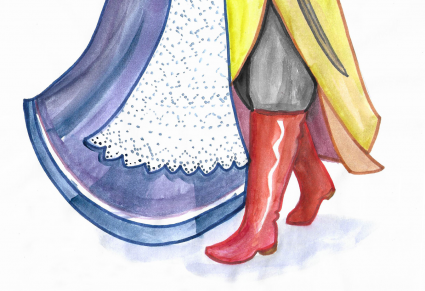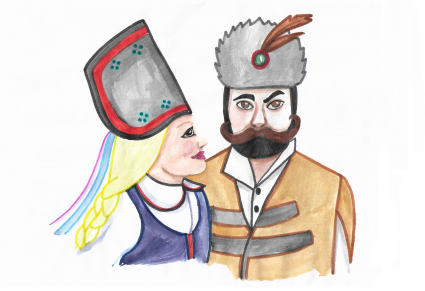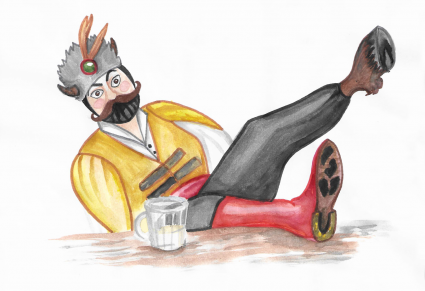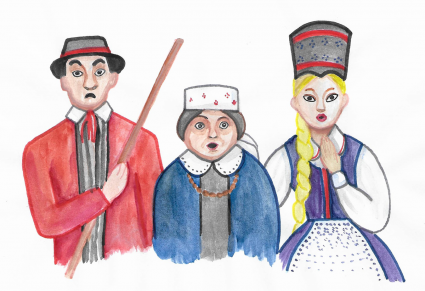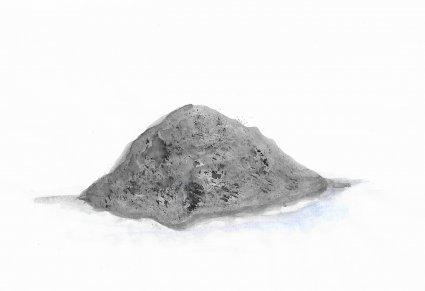Publications
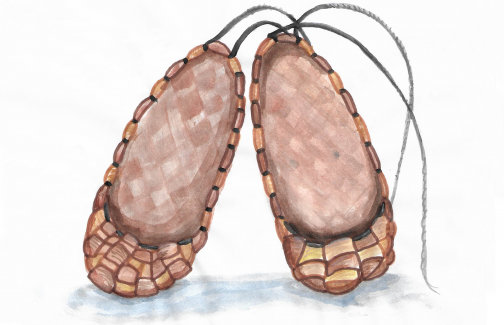
The golden heel of Boruta and the Kurpie bast shoes
Once upon a time, when the forests on the Kurpie rivers of Narew, Rozoga, Omulew, and Orzyc[i] were full of wild animals and filthy devils lived in the swamps, a strange guest knocked on the door of a water mill. He did not look like a man trying to find protection in the Kurpie Forest, though. He was not a peasant fleeing from his serfdom, or a bandit seeking refuge in the forest fastness, or a banished knight, deprived of his property by the Prince. On the contrary, he was a finely dressed nobleman, in a golden robe, knee-high red boots and a curved sword by his side.

“Do, come in, sir,” said the miller bowing. “You’re welcome. I hope you don’t mind our humble company. We’ve gathered here to celebrate my son’s seventh birthday. Please, join us.”
The stranger was given the place of honour at the table. He was served a dish of venison and a jug of beer smelling of heather. He had hardly tasted the meat and the beer when he took out of his traveling-bag a pair of brand new red leather boots, which he placed on the table.
“Have a look, forest dwellers, at these boots made of saffian leather with genuine golden heels. Just like mine. Don’t you want to try them on?”
“We, forest dwellers, can’t afford boots like that,” said the miller. “We all walk barefoot.”
The stranger took another gulp of beer, wiped his moustache and asked kindly, “just try them on. Don’t they look comfortable?”
“But they’re lovely,” said the people. “The mayor of Ostrołęka, or even the starost of Łomża going to the royal court in Warsaw, won’t have any just as good as these. But they are of no use here, in the forest, or in the wet sands.”
“It’s best to check their true value at dance. Poor boots won’t stand the obertas[ii]. They will fall to pieces,” suggested the miller, who had recently moved to the Royal Forest from Przasnysz.
“You’re absolutely right. We have to test these boots. Well, who of you will dance with me?” The stranger looked around and, pointing with his finger at individual women, started calling them by name, which made them feel uneasy. Of course, they loved dancing. What they couldn’t understand was how he knew their names and why he wanted to dance with them, old married women, instead of with young girls.
The stranger was given the place of honour at the table. He was served a dish of venison and a jug of beer smelling of heather. He had hardly tasted the meat and the beer when he took out of his traveling-bag a pair of brand new red leather boots, which he placed on the table.
“Have a look, forest dwellers, at these boots made of saffian leather with genuine golden heels. Just like mine. Don’t you want to try them on?”
“We, forest dwellers, can’t afford boots like that,” said the miller. “We all walk barefoot.”
The stranger took another gulp of beer, wiped his moustache and asked kindly, “just try them on. Don’t they look comfortable?”
“But they’re lovely,” said the people. “The mayor of Ostrołęka, or even the starost of Łomża going to the royal court in Warsaw, won’t have any just as good as these. But they are of no use here, in the forest, or in the wet sands.”
“It’s best to check their true value at dance. Poor boots won’t stand the obertas[ii]. They will fall to pieces,” suggested the miller, who had recently moved to the Royal Forest from Przasnysz.
“You’re absolutely right. We have to test these boots. Well, who of you will dance with me?” The stranger looked around and, pointing with his finger at individual women, started calling them by name, which made them feel uneasy. Of course, they loved dancing. What they couldn’t understand was how he knew their names and why he wanted to dance with them, old married women, instead of with young girls.
“How about my daughter, sir? Just look at her,” suggested a Kurp’s wife.
“Fine,” the stranger twirled up his moustache, “but she’s barefoot and I may tread on her toes, which won’t be proper for a nobleman. She’d better put on these red boots.”
The woman grew suspicious. “Sir, you’re as fretful as a child. Your boots are too large for a girl, they’re good enough for a boy, though. Anyway, I’m giving you my word, that your dancing partner won’t be barefoot.”
“Your word, woman? Where will you find boots in the forest?” asked the stranger, taking a peep at the girl’s legs. In vain, her feet were covered with a long skirt and through the thick home-span he couldn’t see anything.
“I have one word both for a man and for a devil,” she answered, with arms akimbo. “Why don’t you trust a woman who has saved the lives of many a man with her herbs? If you don’t want to dance the obertas with my Maryna[iii], I don’t care. You may go to hell.”
The guest looked at the angry woman. He didn’t say a word, pushed the boots aside, raised from the bench and bowed before the girl. The fiddle sounded, the double-bass boomed, the pipes whistled. The nobleman and Maryna began the dance. The stranger must have spent days and nights dancing, as he was so skilful. He led the girl briskly round the room, either holding her in the waist, or turning cart-wheels with her. Sometimes he turned round Maryna or jumped with the clicking of the heels, shouting joyfully.
The girl also knew all about dancing. From the very beginning, she was equal to him. The changing steps, and the growing pace only made her laugh. She whirled around the room tirelessly, sweeping the clay floor with her skirt. After an hour of dancing the obertas, the powolniak, the wywijany, the wyrwas and the zbójnicki, the nobleman was clearly red in the face. After another hour, his forehead was all sweaty. At the end of the third hour, he was losing his breath, and whistling through the nose. In the fourth hour, he went weak in the knees a few times. Whereas Maryna did not look tired at all and kept dancing gracefully round the room.
“Enough for today,” said the stranger, letting go of the girl and catching hold of the table. He breathed heavily for a while, then sat down on the bench and clinging to a jug full of home brew didn’t stop until it was empty.
“Fine,” the stranger twirled up his moustache, “but she’s barefoot and I may tread on her toes, which won’t be proper for a nobleman. She’d better put on these red boots.”
The woman grew suspicious. “Sir, you’re as fretful as a child. Your boots are too large for a girl, they’re good enough for a boy, though. Anyway, I’m giving you my word, that your dancing partner won’t be barefoot.”
“Your word, woman? Where will you find boots in the forest?” asked the stranger, taking a peep at the girl’s legs. In vain, her feet were covered with a long skirt and through the thick home-span he couldn’t see anything.
“I have one word both for a man and for a devil,” she answered, with arms akimbo. “Why don’t you trust a woman who has saved the lives of many a man with her herbs? If you don’t want to dance the obertas with my Maryna[iii], I don’t care. You may go to hell.”
The guest looked at the angry woman. He didn’t say a word, pushed the boots aside, raised from the bench and bowed before the girl. The fiddle sounded, the double-bass boomed, the pipes whistled. The nobleman and Maryna began the dance. The stranger must have spent days and nights dancing, as he was so skilful. He led the girl briskly round the room, either holding her in the waist, or turning cart-wheels with her. Sometimes he turned round Maryna or jumped with the clicking of the heels, shouting joyfully.
The girl also knew all about dancing. From the very beginning, she was equal to him. The changing steps, and the growing pace only made her laugh. She whirled around the room tirelessly, sweeping the clay floor with her skirt. After an hour of dancing the obertas, the powolniak, the wywijany, the wyrwas and the zbójnicki, the nobleman was clearly red in the face. After another hour, his forehead was all sweaty. At the end of the third hour, he was losing his breath, and whistling through the nose. In the fourth hour, he went weak in the knees a few times. Whereas Maryna did not look tired at all and kept dancing gracefully round the room.
“Enough for today,” said the stranger, letting go of the girl and catching hold of the table. He breathed heavily for a while, then sat down on the bench and clinging to a jug full of home brew didn’t stop until it was empty.
Meanwhile, Maryna’s mother with the other women formed a tight circle round the guest. Also the men were called to join them. “After the long dancing, it’s time to test whose feet have turned out better. Maryna, raise your skirt.”
The girl looked embarrassed, but raised a bit her colourful skirt. Everybody saw she was not barefoot. Her shoes were not made after the town fashion, though. They were not made of calfskin or ox hide but were woven from bast.
“Didn’t I tell you? What are you gaping at?” said the Kurp woman.
“I’ve never seen shoes like that. Can they be called shoes at all?” snorted the nobleman.
“Why are you in doubt, sir? A shoe made of saffian leather is good, just like a shoe made of linden bast. They both protect legs in need. Only Marychna’s shoes were not made by a shoemaker in Łomża but with my own hands. And how do my hands differ from those of a shoemaker’s? Have a good look, sir.” And the angry woman shook her fists right before his nose. “Now it’s your turn, sir. Lift your leg, so we can see the true value of your red saffian leather boots with golden heels.”
The stranger hesitated but soon a young blacksmith jumped to him and lifted his leg high enough for everybody to see the stranger’s foot. They could not believe their eyes seeing a big hole with a black hoof inside instead of the red heel with the golden ring.
“He is a forest devil, Boruta himself, a nobleman from hell,” sighed the young blacksmith.
“Let’s bash him well for all the misfortunes we have had in the forest. When we bind him hand and foot, we’ll take him to Łomża or Ostrołęka for a bath in holy water,” said the miller, grabbing his broom.
The idea was excellent. But the devil outsmarted them all by shouting, “There’s something glittering in the corner. It must be my golden heel. The first to get it will be rich.”
And they all rushed in search of the devilish gold, leaving Boruta alone. On the floor, instead of Boruta’s golden heel, they saw only a pile of ash and felt a nasty smell. At the same time, the door of the mill opened, unhinging itself with a crash. A sudden drought blew off the light. When the resinous chips were lit again, the bench was empty. Only Boruta’s voice could be heard from the ancient oak in a shrill voice snickering at them. The young blacksmith claimed it was a common tawny owl, but nobody believed him.
The girl looked embarrassed, but raised a bit her colourful skirt. Everybody saw she was not barefoot. Her shoes were not made after the town fashion, though. They were not made of calfskin or ox hide but were woven from bast.
“Didn’t I tell you? What are you gaping at?” said the Kurp woman.
“I’ve never seen shoes like that. Can they be called shoes at all?” snorted the nobleman.
“Why are you in doubt, sir? A shoe made of saffian leather is good, just like a shoe made of linden bast. They both protect legs in need. Only Marychna’s shoes were not made by a shoemaker in Łomża but with my own hands. And how do my hands differ from those of a shoemaker’s? Have a good look, sir.” And the angry woman shook her fists right before his nose. “Now it’s your turn, sir. Lift your leg, so we can see the true value of your red saffian leather boots with golden heels.”
The stranger hesitated but soon a young blacksmith jumped to him and lifted his leg high enough for everybody to see the stranger’s foot. They could not believe their eyes seeing a big hole with a black hoof inside instead of the red heel with the golden ring.
“He is a forest devil, Boruta himself, a nobleman from hell,” sighed the young blacksmith.
“Let’s bash him well for all the misfortunes we have had in the forest. When we bind him hand and foot, we’ll take him to Łomża or Ostrołęka for a bath in holy water,” said the miller, grabbing his broom.
The idea was excellent. But the devil outsmarted them all by shouting, “There’s something glittering in the corner. It must be my golden heel. The first to get it will be rich.”
And they all rushed in search of the devilish gold, leaving Boruta alone. On the floor, instead of Boruta’s golden heel, they saw only a pile of ash and felt a nasty smell. At the same time, the door of the mill opened, unhinging itself with a crash. A sudden drought blew off the light. When the resinous chips were lit again, the bench was empty. Only Boruta’s voice could be heard from the ancient oak in a shrill voice snickering at them. The young blacksmith claimed it was a common tawny owl, but nobody believed him.
The forest-dwellers had lost the gold from hell, but they had gained something more valuable, they had learned to weave bast shoes and thus ceased going barefoot.
When the forest-dwellers appeared at the market place in Ostrołęka in their new bast shoes and told the starost about their adventure with Boruta, the town councilor, Pancracy the Shoemaker, remarked critically, “Those red boots of Boruta, and your bast shoes are good for nothing. A shoe must be made by a shoemaker and that’s that.”
The councilors of Ostrołęka agreed with Pankracy that a respectable man should never wear those pathetic bast shoes but only proper shoes made of well-tanned leather of calf or ox, stitched together and shaped on a good last.
The linden bast shoe invented by the Kurp woman was called contemptuously a “kurp”, and the forest-dwellers were named after them a “Kurpik” or a “Kurp”.
Many years passed before these two words took on a new, dignified meaning and the Kurps came to be proud of their name. Today we learn about the brave Kurps and the Kurpie Forest at school, whereas nobody remembers who Pankracy the Shoemaker was. His name has remained only in our legend, just like the famous shoes made by the shoemakers in Ostrołęka.
[i] The Orzyc - right-bank tributary of the Narew; forms, in part, the western border of Kurpie.
[ii] The obertas (oberek) – a Kurpie dance.
[iii] Maryna, Marychna – dialect oral forms of Maria, equivalent to its diminutive form.
When the forest-dwellers appeared at the market place in Ostrołęka in their new bast shoes and told the starost about their adventure with Boruta, the town councilor, Pancracy the Shoemaker, remarked critically, “Those red boots of Boruta, and your bast shoes are good for nothing. A shoe must be made by a shoemaker and that’s that.”
The councilors of Ostrołęka agreed with Pankracy that a respectable man should never wear those pathetic bast shoes but only proper shoes made of well-tanned leather of calf or ox, stitched together and shaped on a good last.
The linden bast shoe invented by the Kurp woman was called contemptuously a “kurp”, and the forest-dwellers were named after them a “Kurpik” or a “Kurp”.
Many years passed before these two words took on a new, dignified meaning and the Kurps came to be proud of their name. Today we learn about the brave Kurps and the Kurpie Forest at school, whereas nobody remembers who Pankracy the Shoemaker was. His name has remained only in our legend, just like the famous shoes made by the shoemakers in Ostrołęka.
[i] The Orzyc - right-bank tributary of the Narew; forms, in part, the western border of Kurpie.
[ii] The obertas (oberek) – a Kurpie dance.
[iii] Maryna, Marychna – dialect oral forms of Maria, equivalent to its diminutive form.
Author/source:
Zdzisław Nowak. Jak Boruta zakochał się w karczmarowej córce
[How Boruta, the devil, fell in love with the innkeeper’s daughter].
Warszawa: Nasza Księgarnia, 1988.
Sent by Justyna Laskowska, the John Paul II Primary School, Ostrołęka.
Translation: Ewa Schramm
[How Boruta, the devil, fell in love with the innkeeper’s daughter].
Warszawa: Nasza Księgarnia, 1988.
Sent by Justyna Laskowska, the John Paul II Primary School, Ostrołęka.
Translation: Ewa Schramm

